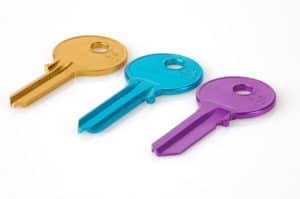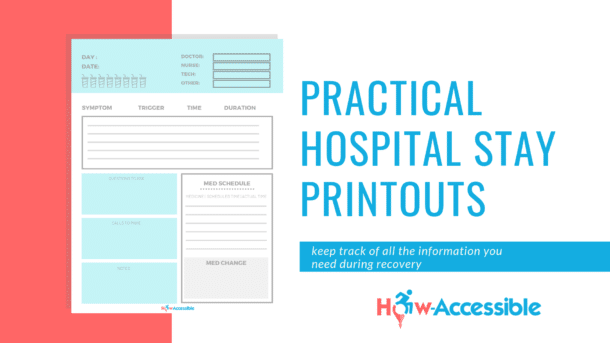Hi, I’m Paola with how-accessible.com. The blog with tons of resources and guides to make your life more accessible.
Recently a member of the How-Accessible team needed to seek emergency medical care after complications during an outpatient procedure. She is currently still admitted and making strides to recovery every day. You can find more information on her journey on the YouTube channel Being Sammy.
Her experience as a long term patient inspired this post and we hope that our readers find some of these suggestions helpful if they are ever in a similar situation.
Why Pack a Hospital Go Bag?
Whether you rarely visit a hospital or you have a chronic illness that requires frequent visits, most people have limited focus and energy when they need to seek emergency medical care. Having a hospital go bag pre-packed will help you remember and transport essential items and make your time at the hospital better.
What to Pack
A Hospital Go Bag should have:
- Phone Charger (that you have tested) and 10 ft braided charging cord
- Spare Key
- Personal Toiletries
- Water bottle
- Change of Clothes
- Assistive Aids
- Printed Medication List and Emergency Info
A Phone Charger

These days staying connected via our smart devices is essential for most people. If you think your stay might go beyond an hour or two (let's face it- most ER visits are four hours or longer) it’s a good idea to pack a charger. Experience has taught How Accessible team members that getting a dedicated 10-ft braided charger is best . This will save you from having to hunt for your regular cord before you head to the hospital and give you enough length to reach hospital room plugs which are usually located behind the bed.
Spare Key
Your biggest concern in an emergency is getting the medical care you need and it should be. But once you’re admitted you may realize that you’ll be away from home longer than expected. If you have a pet at home or need something brought to you, friends and family will have an easier time helping with those errands if you have a spare key on hand.
Personal Toiletries
Wipes
Deodorant
Toothbrush
Hairbrush
Being sick is bad enough without feeling grimy or sweaty. Although the hospital will provide basic grooming products for longer stays having things that you use regularly may be more useful and provide a little comfort. Things like an antiperspirant that works for you or a hairbrush that doesn’t pull your hair can make a big difference.
Change of Clothes
A few pairs or undergarments will be good to have while you are still in a hospital gown after a day or two. Depending on where you stay you may be allowed to change into your regular clothes once you are in a stable condition. It’s a good idea to pack a set of comfortable PJs and a loose fitting change of clothes for when you are discharged or if your stay requires rehab training. Pockets may be important if you still need to wear a telemetry unit but each place will be different
Assistive Aids
This will vary from person to person. If you have extra sensitive hearing earplugs or a noise reducing headset might make your stay more comfortable. If you are very sensitive to light a pair of sunglasses may help make fluorescents more tolerable. Sometimes conditions that are manageable on good days become more difficult to bear when we are ill. We encourage you to consider this when packing up your hospital go bag.
Printed Medication List and Medical Info
Having a printout with important medical information will be a great resource for you as a patient and for your medical team.
Information Included:
- Insurance Contact Info and Membership Info (Provider)
- Primary Care Provider Contact Info
- Pharmacy Information
- Specialist Contact Info
- Medication List (Name/ Dosage/ Frequency/ Prescribing Doctor / Interactions
- Allergies
- Medical Proxy Info
- Emergency Contact Info
If you want an easy way to keep track of your important medical info check out How Accessible’s Hospital Stay Printables.
FTC Disclaimer: This is not a sponsored post. All opinions are genuinely my own. This post also contains affiliate links and I earn a small commission if you make a purchase after clicking on my links. It doesn’t cost you any extra.










Recent Comments